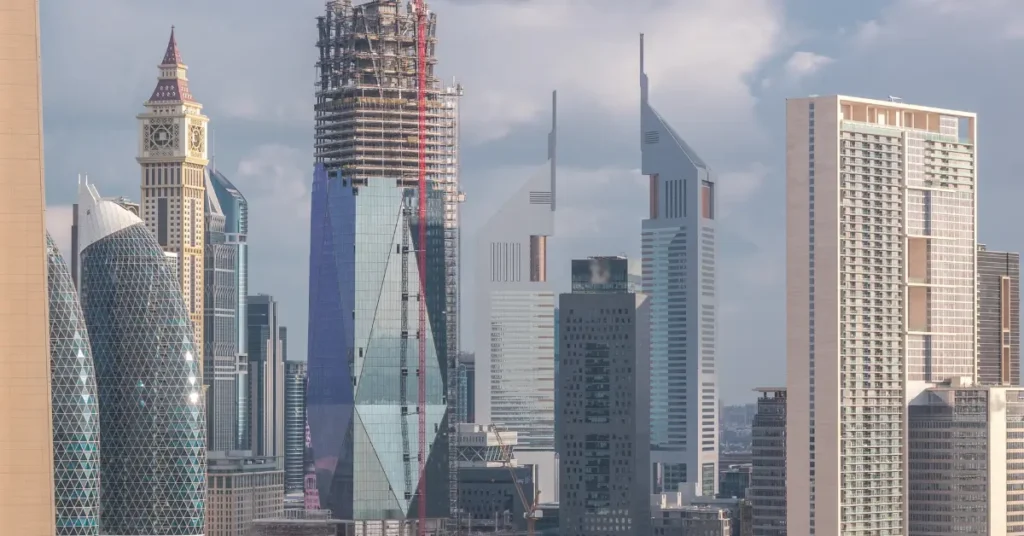The UAE adopts a dual legal system of Civil and Sharia laws. This legal structure is further complicated by the coexistence of federal and local courts, as well as specialized courts in financial free zones like the Dubai International Financial Centre. These free zone courts operate under common law principles, adding another layer of complexity to the UAE’s legal system.
Dubai is renowned for its unique legal framework, where the onshore Dubai Courts operate under civil law, while the DIFC Courts within the Dubai International Financial Centre follow a common law system.
In this article, we will explore the differences between Dubai Courts and DIFC Courts, two distinct judicial systems operating within Dubai. Parties involved in legal disputes in Dubai must know these differences as the choice of jurisdiction can significantly impact the outcome of a case.
Legal Framework of DIFC Courts Vs Dubai Courts
DIFC Courts
The Dubai International Financial Centre (DIFC) is a prominent financial free zone located in Dubai. It operates as an independent jurisdiction within the UAE, governed by its own legal and regulatory framework.
DIFC has its own independent court system known as DIFC Courts. DIFC Courts are governed by their own set of laws and regulations, separate from those applicable to other courts in Dubai. These Courts follow a common law framework and conduct proceedings exclusively in English. This makes them different from other courts in Dubai where Arabic is the official language.
Dubai Courts
Dubai Courts are governed by two main legal systems i.e., Civil Law and Sharia Law. The Civil Law framework provides a detailed set of codified rules that judges can directly apply to resolve disputes. Simultaneously, Sharia Law functions alongside civil and criminal courts, particularly in personal status courts, which handle family-related matters such as divorce, inheritance, child custody, child abuse, and guardianship of minors.
Jurisdictional Differences Between DIFC Courts and Dubai Courts
DIFC Courts
Handles civil, commercial, and financial disputes within DIFC
DIFC Courts have exclusive jurisdiction to hear and determine civil and commercial cases wherein the parties opt into the jurisdiction of DIFC Courts in the contract, where the dispute involves a DIFC-established party, or if the dispute has occurred in DIFC.
Jurisdiction based on opt-in clauses for non-DIFC entities
Non-DIFC entities can opt into the DIFC Courts’ jurisdiction by including “opt-in” clauses in their contracts. These clauses enable parties to select the DIFC Courts for dispute resolution, even if they have no direct connection to the DIFC.
Enforcement of DIFC Court judgments
To enforce or execute a DIFC Court Judgment within DIFC, a Judgment creditor must approach the Execution Judge and apply for its enforcement. If the Judgment debtor does not make payment during the execution proceedings, the Execution Judge has the power to take specific measures, such as a charge over the property, attachment of assets/earnings, or execution against assets to execute the Judgment.
Enforcement through Dubai Courts
A DIFC Court Judgment can be enforced through the Dubai Courts if the following conditions are met.
- The Judgment has become final and executory.
- The Judgment has been certified by the DIFC Courts for execution.
- The Judgment has been legally translated into Arabic.
The party seeking enforcement must first obtain an execution letter from the DIFC Courts. Thereafter, the party must submit an application for enforcement to the Execution Judge at the Dubai Courts, accompanied by the execution letter and an Arabic translation of the Judgment. On receipt of the application, the Dubai Courts must enforce the Judgment following the Federal Civil Procedure Law.
Enforcement outside UAE
The enforcement of DIFC Court Judgments, decisions, and orders outside the UAE will be precisely the same as the enforcement of a Judgment of the Dubai Courts. Where a relevant treaty (such as the GCC Convention or Riyadh Convention) exists between the UAE and the target jurisdiction, enforcement will be governed by the terms of that treaty. Where no treaty is in place, enforcement will depend on the state’s laws in which the Judgment creditor seeks to enforce the Judgment.
Dubai Courts
Covers all disputes under UAE civil law
Dubai Courts, which operate under the UAE’s civil law system, cover a wide range of disputes, including civil, commercial, criminal and personal status. Dubai Courts also incorporate Sharia principles in specific areas like personal status cases. Unlike Dubai Courts, DIFC Courts do not have jurisdiction over criminal or personal status matters.
Enforcement of Dubai Court judgments
A Judgment can be enforced through the Dubai Courts after it has become final and has been certified for execution (writ of execution). A Judgment creditor is required to approach the Execution Division of the Dubai Courts and apply for its enforcement.
Thereafter, the Judgment debtor is notified about the execution procedure and is given fifteen days to pay the outstanding sum. If the Judgment debtor fails to pay within fifteen days, the Judgment creditor can request the Court to take certain measures such as attachment of bank accounts or properties, travel ban and arrest.
Key Areas of Conflict
Commercial Disputes: When businesses opt for DIFC Courts vs Dubai Courts
Businesses often prefer the DIFC Courts for their English-language proceedings and common law framework. DIFC Court’s judges, equipped with specialized expertise and knowledge, are adept at handling complex disputes. This proficiency fosters confidence among businesses that their legal matters will be resolved with professionalism and a deep understanding of industry-specific challenges.
Contractual Choice of Jurisdiction: How businesses use opt-in clauses
Businesses can specify in their contracts whether they prefer the DIFC Courts or Dubai Courts for dispute resolution, allowing them to choose the jurisdiction that best suits their needs.
Overlap and Parallel Proceedings: Potential for conflicting rulings
The DIFC Courts and Dubai Courts often face challenges stemming from overlapping jurisdiction and the initiation of parallel proceedings. These issues arise when parties file cases in both courts resulting in delays and conflicting judgments. For example, one party may initiate proceedings in the DIFC Courts while the other files in Dubai Courts to delay outcomes.
Recent Developments and Legal Reforms
To address the jurisdictional conflicts, mechanisms have been introduced over the years. The Joint Judicial Committee, established by Dubai Decree No. 19 of 2016, was tasked with resolving jurisdictional disputes between the DIFC Courts and the Dubai Courts. This body determined which court had jurisdiction over a case and addressed conflicting judgments between the two courts.
In 2024, a new entity called “Judicial Committee for Resolving Conflicts of Jurisdiction between DIFC Courts and Judicial Bodies in the Emirate of Dubai” (known as “Conflicts of Jurisdiction Tribunal”) was established by Decree No. 29 of 2024. This new committee replaced the previous Joint Judicial Committee, expanding its jurisdiction to include disputes involving other judicial bodies, such as the Dubai Rental Disputes Resolution Centre. Decisions issued by this committee are final and cannot be appealed.
A significant development introduced by the decree is the adoption of a binding precedent system. Legal principles established in the committee’s rulings are now considered “judicial principles” and must be adhered to by DIFC Courts as well as the judicial bodies in Dubai.
Conclusion
Dubai Courts follow a civil law system rooted in Sharia Law and federal UAE laws. They handle a broad range of cases, including criminal, civil, and family matters. Proceedings in Dubai Courts are conducted in Arabic. In contrast, DIFC Courts operate under an independent common law system, primarily addressing civil and commercial disputes within the DIFC or where parties opt for their jurisdiction. These courts use English as the primary language.
Selecting the right jurisdiction involves a number of factors such as legal framework, enforceability, costs, expertise etc. This decision should align with the nature of the dispute and the parties’ strategic priorities to achieve an effective resolution.
Get Expert Legal Advice on DIFC and Dubai Courts with SK Legal
Understanding jurisdictional conflicts between DIFC Courts and Dubai Courts is essential for legal professionals and businesses operating in the UAE. At SK Legal, we provide expert guidance on navigating these complexities and choosing the right legal forum for your case.
Our services include:
- Comprehensive Legal Consultancy: Expert guidance on jurisdictional issues.
- Efficient Dispute Resolution Strategies: Advice on choosing the right court for legal matters.
- Specialised Legal Support: Assistance in enforcing judgments and structuring contracts.
For personalised legal advice on DIFC and Dubai Courts, contact us at [email protected]
Author

Sameer Khan is one of the Best Legal Consultants in UAE, and Founder and Managing Partner of SK Legal. He has been based in UAE for the past 14 years. During this time, he has successfully provided legal services to several prominent companies and private clients and has advised and represented them on a variety of projects in the UAE.


